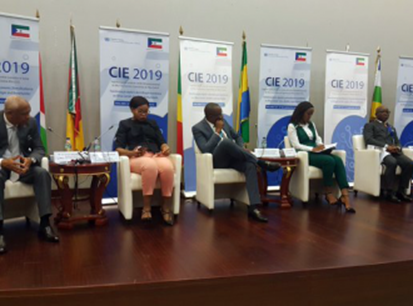It is urgent to break away from generic and unproductive approaches towards digital transformations in Central Africa that have caused no real change on the ground for the last two decades and act on a new paradigm that would spur sustainable development in the subregion, experts have asserted.
The entreaty was made during a high-level debate on the digital economy in Central Africa, described as the least advanced on the continent, on the first day of the 35th session of the Intergovernmental Committee of Senior Officials and Experts (ICE) for the subregion.
The conference has assembled more than a hundred senior policy functionaries, experts in sectors linked to the digital productivity, private sector champions, academics, youth and women entrepreneurs and the media in Malabo, Equatorial Guinea’s main island city.
A cross-section of the senior officials and experts said this is the time to laser-focus on a workable vision and plan of action for digital transformations in the subregion so that 20 years on, member States do not come back to have the same pale conversation which have characterised meetings of such magnitude for the past two decades with limited clues for action.
The debaters canvassed for stronger capacity for evidence-based analysis and systematic project preparation, for coherent policies and coordination of government interventions across the subregion as well as for unprecedented political will towards the digital changeover.
Ms. Reine Mbang Essobmadje, CEO of digital policy and strategy firm – Evolving Consulting – who is also the Chair of the Economic Commission of Cameroon’s National Employers Association (GICAM, in French), argued that Central Africa was in dire need of carefully designed and actionable strategies for digital transformation rather than on a happenstance approach.
She pleaded for governments to work with the private sector to implement recommendations from a gamut of worthwhile studies that have gathered dust on shelves and to consider mainstreaming the informal sector as a principal lever of the digital economy.
“Like in every other sector, leadership is important to move things forward,” she maintained, stating that without committed leadership, what has caused stagnation in other sectors would effect the same results in the march towards the digital economy.
The experts and senior officials laid a case for smart incentives, including tax exemptions, for the importation of equipment for digitally led productivity, based on comprehensive cost-benefit analysis in tune with the local context.
In this regard, the Representative of the International Telecommunications Union (ITU) for Central Africa and Madagascar – Mr. Jean-Jacques Massima Landji projected that “if our governments don’t incentivise instruments of the digital economy, by reducing the tax label on them, we would miss the fourth industrial revolution.”
He decried an overbearing tax regime on digital goods, which should be seen as pivots for creating value addition in manufacturing, and services, which can then provide better streams of value added tax.
In concurrence, Mr. Jean-François Le Bihan, Director of Public Policy for Sub-Saharan Africa of the GSM Association (GSMA), said too much taxing of digital products, which stimulate economic activity across the board, would prove counterproductive.
A motion was made for upgraded laws and regulations to cushion the smooth take-off of the digital economy accompanied by appropriate institutions to peddle progress, as well as for shared cross-country visions for the digital age.
Mr. Norberto Bartolomé Monsuy, Adviser at the Presidency of Equatorial Guinea on digitization said his country’s Government is adopting strategies to boost private investments in the digital economy and was already consulting with its telecommunications regulators and telephony companies to bring down mobile telephony rates as a stimulant to the digital economy.
“Our subregion is one of the smallest in the world, so it is time to break our silos and work together as a team,” he said in a candid vote for regional integration in all spheres but more so in the digital ecosystem.
Experts and attendees from the audience counselled against generic recommendations on trotting Central Africa’s digital economy but on actionable models.
In this regard, some elements for an eventual model were put forth, including: sound and coherent national and regulatory frameworks that support innovation and entrepreneurship development; the development of broadband and neighbouring infrastructure to “reach the last mile” providing adequate access to every segment of the society; affordable services to expand the community of users and increase internet penetration; digital literacy and training to ensure that the digital economy does not remain a luxury of the few; anchoring digital transformations on governing instruments and economic sectors (such as agriculture, education, trade, health, manufacturing, finance, culture, information and communication); making STEMS the focus of education and establishing digital innovation hubs to ensure that Central Africa enters the league of creators of knowledge products and not remain a mere consumer.
All said and done, the Vice President of the Development Bank of Central Africa (BDEAC) –
Mr. Marcel Ondele, said there was enough money in the world for good projects and called Central Africa to improve the bankability of its projects if it wants to promote the digital economy.
Member States noted that the on-going structural adjustment programmes aimed at restoring macroeconomic stability in the sub-region limit the ability of governments to make massive investments in the sector. They pointed to the need to secure the necessary fiscal space to promote digital transformations in Central Africa



